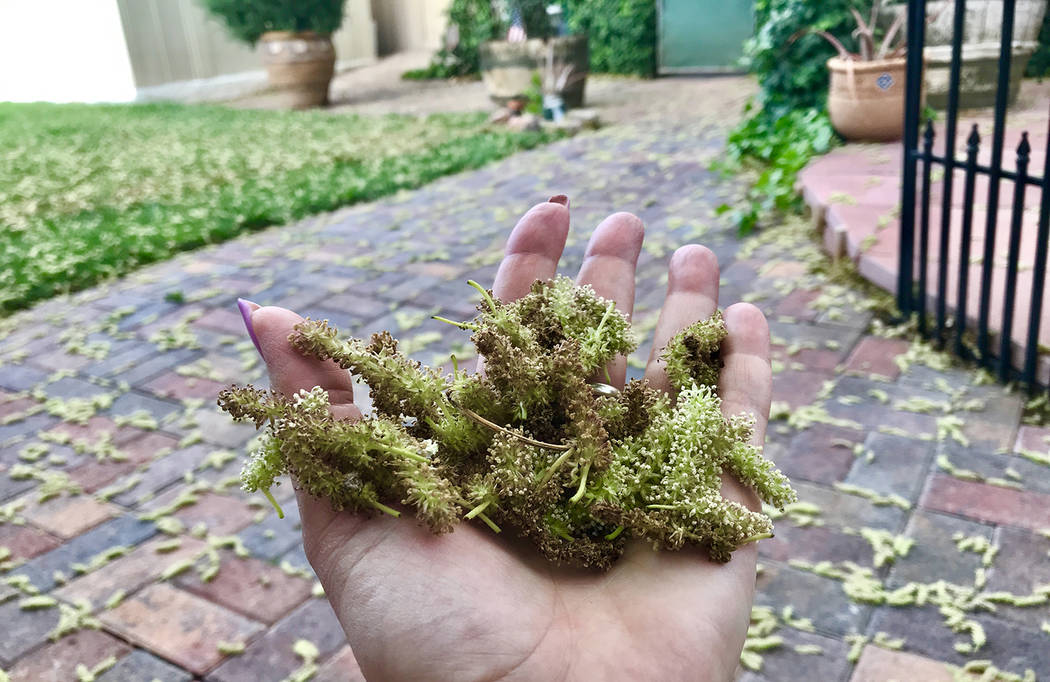
Over the Easter weekend I watched Cecil B. DeMille’s classic “The Ten Commandments.” In the dramatic scene when Moses receives the tablets, it reminded me that while Mount Sinai had a burning bush, Boulder City has smoking trees. OK, maybe not actually smoking, but the mulberry trees here sure look like they are when releasing pollen.
For the first time last week I witnessed these puffing pollen pods, and while I was amazed by nature’s bizarre and brilliant ways, I cringed for all the allergy sufferers.
Spring in Boulder, with its mild temps and colorful blooms, is so gorgeous, but for those of us with allergies, it’s a nightmare. There’s not much we can do to control the air outside our homes, but indoors, we’re the boss of our air quality.
Here are a few tips to help reduce allergens in your home.
Use MERV-rated HEPA HVAC filters and change them regularly. A home’s heating, ventilation and air-conditioning system, or HVAC, is designed with filters that primarily function to protect the system from debris entering it. Standard filters won’t trap microparticles like pollens.
High-energy particulate air filters, or HEPA filters, are made from densely packed layers of fiberglass that block these tiny particulates. Additionally, look for HEPA filters that use MERV ratings (minimum efficiency reporting system). MERV ratings run from 1 to 12, with a higher the number indicating greater ability to capture smaller particles.
Generally a MERV rating of 10 or higher is best for allergy sufferers. Consult with an HVAC specialist to know what’s optimal for your home and system.
Use a home air purifier. A proper HEPA filter is a good first line of defense for improved air quality, but to really “clean” the air, you need a home air purifier. My partner and I are both asthmatics and allergy sufferers. We added two Alen tower type air purifiers to our house, and the benefits have been life changing.
Air purifier specialists at Alen Corp. recommend that when researching an air purifier some of the first things to consider are room coverage area, air-quality concerns, filter availability/cost and warranty. Noise level is also important, especially for bedrooms, so look for units that are “quiet operation” and not just at its lowest setting.
Remove tree and shrub litter from around your HVAC unit. A properly functioning HVAC is your first step to better indoor air quality. With all the blooms and pollen that drop in spring, its almost deserving to have been named fall. Debris buildup reduces a unit’s efficiency by blocking airflow and can actually cause your unit to age more quickly.
Blocked airflow can also raise your power bill. Spring is an important time to make sure the area around your unit is clear. With the unit off, remove any debris within at least 2 feet of the unit’s base.
Keep your windows closed and HVAC on. I know, I know, it’s that lovely time of year when neither the air conditioner nor the heat needs to run. We crave some fresh airflow with the windows open, but not with pollen ratings of “high” these days. If the air in your home feels stale, run your HVAC in fan mode for circulation.
Clear pathways to your entries. If you don’t remove your shoes when entering your home, clear paths of debris leading up to your door to reduce tracking pollen and other allergens into your home.
As for that evil mulberry pollen, many cities have outlawed planting mulberry trees because of the amount of pollen they produce. That said, Boulder City has myriad mulberry trees that have been here since the building of the city.
Yes, this time of year makes them the enemy of many, but let’s remember the beautiful umbrellas of shade they provide when the heat really hits … at least that’s what we keep telling ourselves with two mulberries in our front yard and one in the back.
A seasoned veteran of home improvement, Norma Vally’s career includes four seasons as host of Discovery Home Channel’s Emmy-nominated series “Toolbelt Diva.” A columnist and author, Vally splits her time between Southern Nevada, Los Angeles and New York. Follow her on Facebook at Norma Vally “Toolbelt Diva” and visit her at www.NormaVally.com. Email Norma@NormaVally.com.